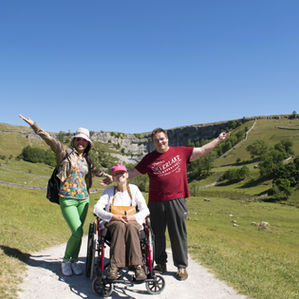
Supported Independent Living (SIL) &
Respite care services
We are committed to creating an ideal home for a person with a disability, by providing care that values the individual's unique needs.
We aim to foster an environment that is based on friendships and genuine care between caregivers and NDIS participants living in the home.
Sharing life together and supporting your independence with tasks of daily living, is our goal.
For SIL Vacancy enquiry - please contact us on 1300 323 399
What is SIL Supports?
Also known as NDIS disability homes, it is a type of residency and support arrangement under NDIS, where 24/7 support is provided by a SIL provider to build your independence.
Disability supports in this type of residency are carefully planned and organized on a roster of care, to ensure that care is provided 24/7 as per the need of the client. The participant lives in a home that is arranged and/or organised by the SIL home provider.
SIL Provider ensures that the support is provided by adequately skilled, friendly and caring disability support staff supporting participants with daily routines, community outings, attendance to appointments and engaging in other activities of interest. This type of arrangement can be in the form of medium to long-term arrangements.
SIL provider responsibly maintains the level of support needed as required in a SIL home enabling a client to live as independently as possible and helping to build their day-to-day life skills.
How is SIL supports funded under NDIS?
1. NDIS funding for Daily Living Supports
These are fortnightly payments, that are claimed from NDIA from the yearly funding packages within your NDIS plan. You need to be eligible for NDIS SIl package before looking for a SIL accommodation.
Once you have the approval, service providers like us can then work with you, your family, or your support coordinator to build a support structure around your needs and the SIL Funding is negotiated between the service provider and NDIA based on your requirements.
A Quotation is then submitted by the SIL provider to NDIA using a tool called NDIS SIL Quoting tool. The submitted Quote must align the support ration in accordance with the criteria of reasonable and necessary supports, as per the NDIS SIl rules.
2. Rent and Board (Disability Support Pension)
NDIA funding does not cover rent and board costs in a disability accommodation such as SIL.
So, during your stay in the SIL accommodations, the rent and board costs can be paid from your Disability support pension that you may be receiving from Centrelink.
The rent and board costs could also be paid via any other sources of income you may have depending upon the choice you make and as agreed with the service provider. Usually, the service provider charges up to 75% of each component of income related to your disability which makes up your total Centrelink income.
3. Transport (NDIS funded)
Transport funding in NDIS is the same funding but with a new name and replaces the Mobility allowance payment that was previously paid by Centrelink.
Costs for transport while you are living at a SIL home, are billed separately by the SIL provider. These payments can be made to the provider from the fortnightly transport income that you receive from NDIA. There are three tiers of transport funding in NDIS and the amount you receive is based on the assessment done by the NDIA planner while your funding is approved. The charges for transport and what would be covered will be discussed with you by SIL provider during your intake process.
SIL at ELS Disability Services
Our SIL team can help you find a home to call your own. Live as independently as possible, with the support you need.
Here’s what you need to know about our Supported Independent Living (SIL).
What support will ELS provide me?
ELS Homes provide our clients (NDIS participants) with a comfortable and safe place to live.
We will support you with all day-to-day tasks like:
-
Cleaning and laundry
-
Nutrition and cooking
-
Personal care such as showering and dressing
-
Going to appointments
-
Taking medication
-
Taking up a hobby
-
Learning to catch public transport.
Will I be included in household decisions?
Yes! All our clients (ndis participants) are part of the household routines and decisions.
This can be done in different ways depending on what each household prefers. As an example, in some houses, the housemates choose to sit down for a meeting each week to make decisions about their home.
What type of properties does ELS offer?
We can help you can choose from our available homes based on your preference for location and type of home. If we do not have one available that exactly suits your needs, we can set up one.
We will work with you to find something that’s just right.
Speak to our friendly team today on 1300 323 399 and find out more.
Whom will I be living with?
We know it’s important that people are comfortable with each other as sharing a home together and get along.
We’ll work very closely to learn about who you are and what you like, to match you with the right housemates!
Do you provide Specialist Disability Accommodation (SDA)?
At this stage, we do not provide Specialist disability accommodation. But we can find you something within our network of providers.
What is the Supported Independent Living funding category?
Supported Independent Living is funded under Core Supports – Assistance with Daily Life in your NDIS Plan.
The NDIS does not fund the cost of rent, board, transport, and other day-to-day expenses such as food and activities.
Please note: We bill in line with the prices as per the latest NDIS Pricing Arrangements booklet, which generally increases annually.
Types of disability accommodations -
Short Term Accommodation or respite care
Short-term accommodation also known as respite is a type of support that is aimed to give carers a break from their caring role. This could be for a few numbers of days on a regular basis, in an emergency also known as emergency respite and/or on a one-off basis.
This model of living is similar to the SIL home model but is for a shorter period and may be typically for 24 hours to 14 days. The support is built around NDIS participant's daily needs providing them with 24/7 support, however, respite care support is usually for a short period of time (For some days only).
How is Respite funded under NDIS?
The funding for respite or short-term accommodation can be made available from an NDIS participant's core budget of the NDIS plan. As per NDIA if the respite care support is expected to increase by more than 14 days then Supported independent living should be considered. The participant should seek a plan review by contacting NDIS Helpline on 1800 800 110 or by completing the Home and Living form by seeking assistance from the support coordinator if you have one available.
What are the charges for Respite care?
The charges for Short term accommodations or Respite are billed at an hourly or daily rate from the core funding of your NDIS plan. The claimable hours and support ratio will be discussed with you by the service provider. This is mostly done in the form of a written agreement in advance before the start of the respite care arrangement. The bill charged to your plan per hour or per day would include utilities, transport and food costs including rent and support. You do not have to pay any separate rent or board or transport in this model as this will all be bundled together.
Independent living options (ILO)
This type of dwelling arrangement is more focused and is based on designing a flexible package of support based on your needs and preferences. It is a staged implementation with a package targeted for primary and supplementary supports. This is then closely monitored for fine-tuning.
Six principles of Shared living - a useful Starting point for assisting people to explore ILO
Self
Determination
Belonging &
Connection
Flexibility
Choice
Trust
Independent
Living
Shared
Living
The living arrangement under ILO includes -
-
Co-Residency – This type of arrangement aims to provide a live-in person staying full-time or part-time in the participant's home.
-
Host Arrangements – In this arrangement, a participant resides full-time in the home of a non-related host who then supports the participant on an agreed and needed basis.
-
Living Alone – This category aims at providing support in the home of the participant in a variety of ways
-
Living Together – This arrangement of ILO aims at developing a model of support, where a participant lives with other people of choice and receives support.
With ILO, supports are paid from your plan package from NDIA however the type of living arrangement dictates the other costs that include rent and board, and also transport.
Call us today to discuss your individual options and we are confident to assist you with all your SIL, STA, or ILO needs.
For more information check our blog on ILO here








